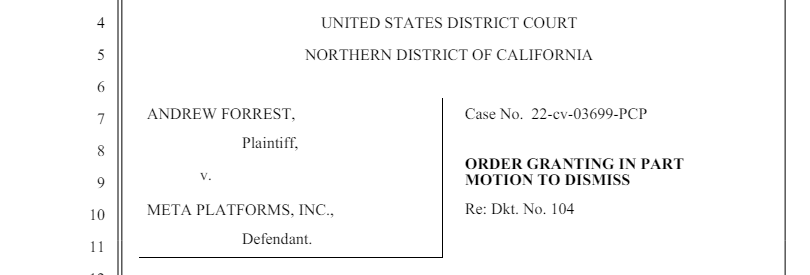Australian mining magnate Andrew Forrest scored a legal victory against Meta Platforms this week after a US judge rejected the company’s attempt to dismiss his lawsuit. Forrest alleges Meta (which owns and operates Facebook, Instagram, Threads, and WhatsApp, among other products and services) facilitated a massive crypto scam campaign that used his image and deepfakes to swindle millions from unsuspecting victims.
Facebook: On Fake Endorsements And Real Losses
The lawsuit centers around a series of Facebook advertisements that fraudulently depicted Forrest endorsing cryptocurrency schemes and other dubious investment opportunities. According to court documents, over 1,000 such ads ran in Australia between April and November 2023.
These ads were designed to appear legitimate, employing tactics like fake testimonials and doctored videos featuring Forrest. Forrest claims some of these deepfakes were created using Meta’s own advertising tools, which leverage generative AI to enhance visuals.

The impact of this campaign was far-reaching. The lawsuit alleges that these deceptive ads resulted in millions of dollars in losses for victims. Forrest argues that Meta’s lax advertising practices and prioritization of ad revenue directly contributed to the scam’s success.
A Landmark Case For Social Media Accountability
This lawsuit has the potential to be a landmark case in the ongoing battle to hold social media platforms accountable for the content they host. Traditionally, platforms like Meta have enjoyed broad protection under Section 230 of the Communications Decency Act, which shields them from liability for content posted by third-party users.
Dr. Andrew Forrest sued Meta over scam Facebook ads that included deepfakes of him promoting crypto.
He alleged that Meta’s software helped to create some of the scam ads via GenAI tools.
Today, the court ruled that his publicity rights and negligence claims can go forward. pic.twitter.com/LH7jQ6wFVP
— Rob Freund (@RobertFreundLaw) June 18, 2024
However, Forrest’s case hinges on the argument that Meta actively aided in the creation and dissemination of these deceptive ads through its advertising tools and inadequate review processes.
Judge Casey Pitts rejected Meta’s dismissal motion, and acknowledged the potential significance of the case. He wrote that Forrest claims Meta profited more from ads that included his likeness than it would have if the ads had not. “This is enough to adequately plead that the alleged misappropriation was to Meta’s advantage.”
Total crypto market cap currently at $2.3 trillion. Chart: TradingView
The Challenge Of AI-Generated DeceptionThe use of deepfakes and AI-generated content adds another layer of complexity to the issue. These technologies can create highly realistic and convincing forgeries, making it increasingly difficult for users to discern genuine content from cleverly crafted scams.
The outcome of this lawsuit is still uncertain. However, it has already sparked a conversation about the responsibility of social media giants like Facebook and the potential dangers posed by unregulated AI technology.
Featured image from Getty Images, chart from TradingView










